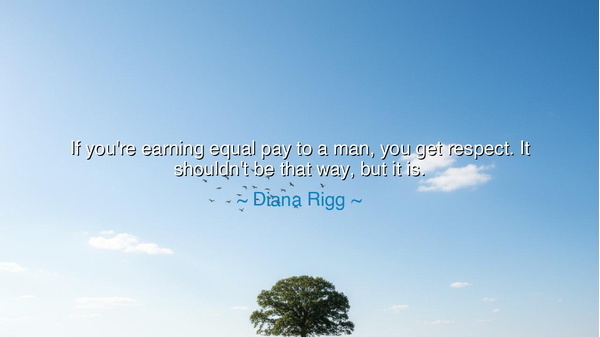
If you're earning equal pay to a man, you get respect. It
If you're earning equal pay to a man, you get respect. It shouldn't be that way, but it is.






Hear the voice of Diana Rigg, who with clarity and sorrow declared: “If you’re earning equal pay to a man, you get respect. It shouldn’t be that way, but it is.” In this confession lies a piercing truth about the order of our world—a truth both bitter and revealing. For in these words, she does not praise equality, but exposes its absence. She unveils the injustice that respect, which should flow freely from dignity and talent, is too often tied instead to the coin and the contract, to the measure of wages, rather than the measure of worth.
The meaning of her words strikes like a bell in the darkness. Rigg reminds us that in many lands and professions, a woman must first fight for equal pay before she is granted the same honor a man receives by default. Her lament—“It shouldn’t be that way”—is both a recognition of progress and a cry against its incompleteness. For true respect should come not from numbers upon a ledger, but from the recognition of skill, wisdom, and humanity. Yet the world, bound in its old prejudices, too often withholds esteem until compelled by balance sheets.
The origin of this statement lies in Rigg’s own life as an actress in mid-20th century Britain. Though celebrated for her brilliance on stage and screen, she discovered that her salary was a fraction of her male co-stars. She dared to speak out when silence was the custom, exposing the hidden chains of inequality in an industry gilded with glamour. Her words were forged in the fire of experience, where she had seen talent overlooked and dignity diminished, not because of lack, but because of gender. Thus, her quote is not idle philosophy but lived testimony.
History too bears witness to this struggle. Recall the story of Susan B. Anthony, who in the 19th century fought not only for the vote but for the recognition of women’s labor. She declared, “Men, their rights, and nothing more; women, their rights, and nothing less.” She saw clearly, as Rigg did, that a woman’s worth was too often measured by her obedience and her silence, rather than her ability and her contribution. Through persistence, Anthony and her sisters in struggle cracked the walls of inequality, though much remained standing.
The emotional power of Rigg’s lament is sharpened by its paradox. On one hand, it recognizes the hard reality: that society bestows respect only when forced to admit equality in wealth. On the other, it challenges us to imagine a nobler order, where respect is not purchased but freely given, where a woman is honored for her voice, her work, her art, and her truth. She reminds us that it is not enough to balance the scales of pay; we must transform the hearts that hold those scales.
The lesson is clear: we must not rest content with the appearance of equality, but labor until respect springs not from money, but from recognition of shared humanity. This requires both courage and vigilance. For change does not come when truth is hidden, but when it is spoken aloud. Like Rigg, we must name the injustice, even when others would have us remain silent. Like Anthony, we must build movements that endure beyond our own lifetimes.
Therefore, let your actions reflect this wisdom. In your work, demand fairness not only for yourself but for others. If you hold power, pay justly. If you follow, support those who speak against inequality. Teach your children that respect is not bought but earned by character and effort. And above all, refuse to accept as permanent what Rigg called out as flawed: a world where dignity follows wages, instead of wages following dignity.
And so, remember the cry of Diana Rigg: “It shouldn’t be that way, but it is.” Let it be both a warning and a call. For until we labor to change this truth, we walk in a world half blind, granting honor only when forced. But if we rise with courage, we may yet bring about the day when respect flows as it should: not from the weight of gold, but from the worth of the soul.






AAdministratorAdministrator
Welcome, honored guests. Please leave a comment, we will respond soon